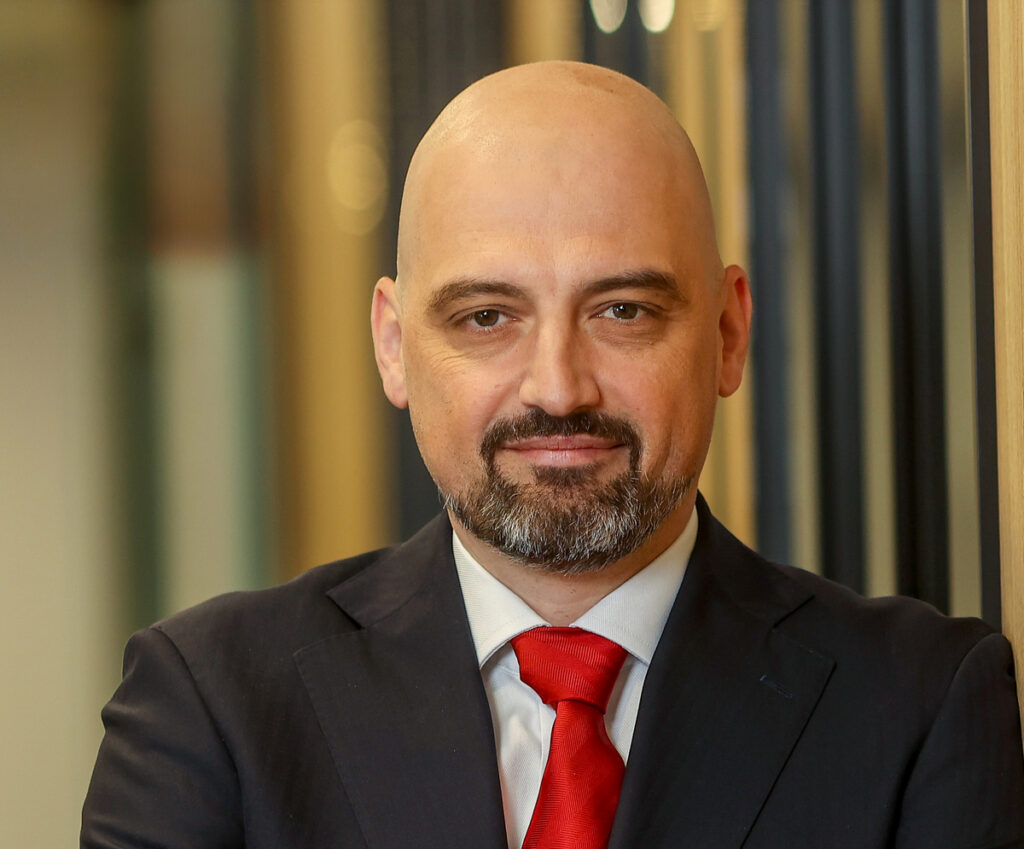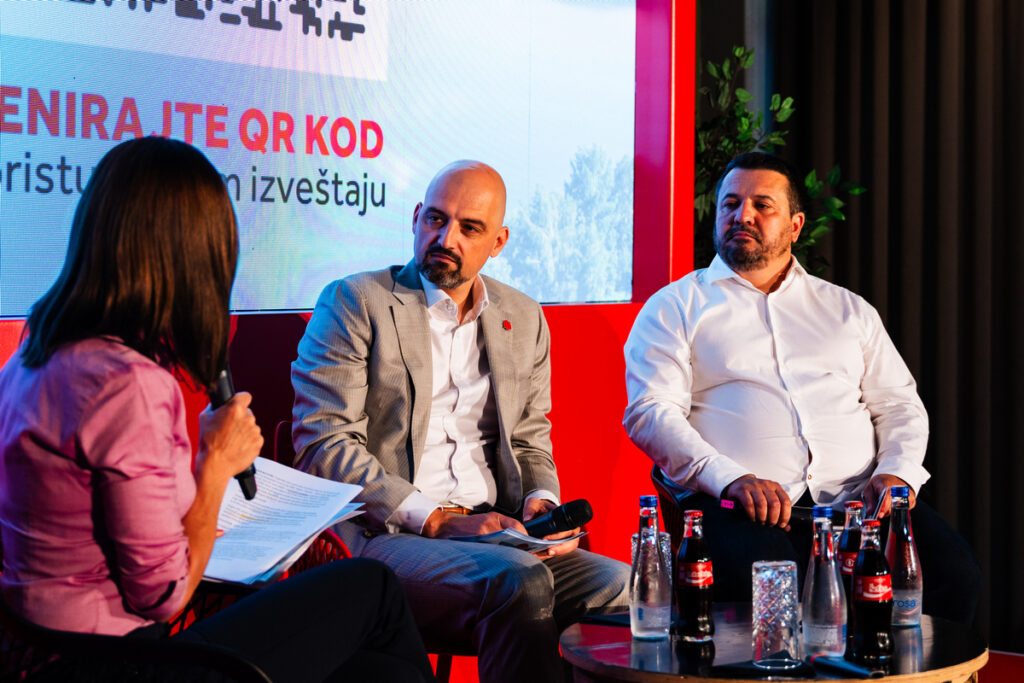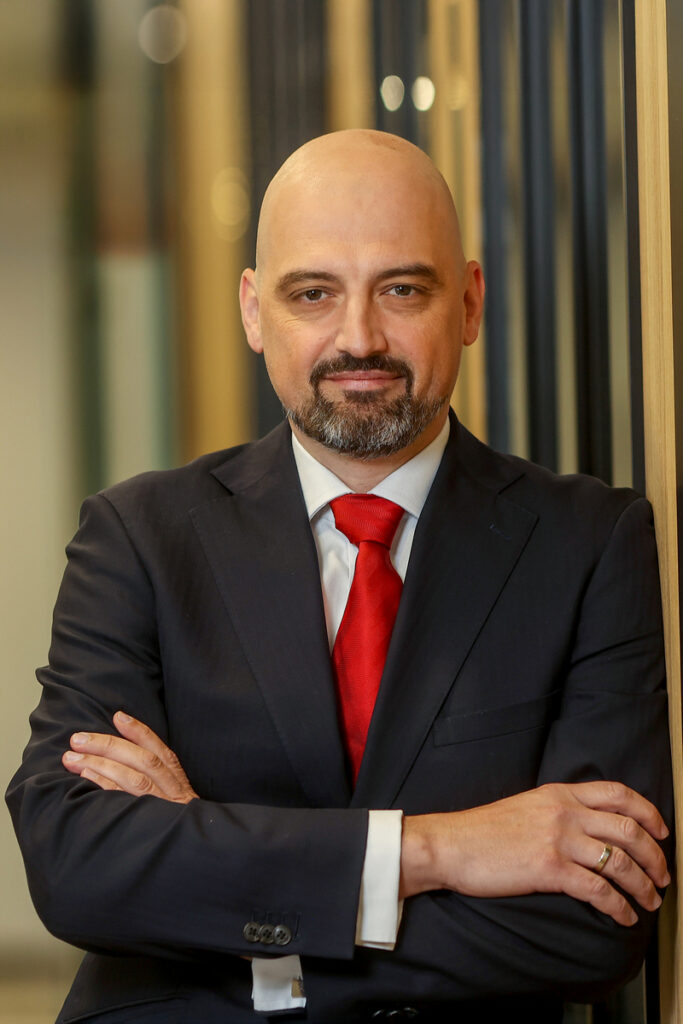Connecting global innovation with local impact for long-term, sustainable success

In today’s business environment, sustainable growth requires readiness for constant change. This kind brings new value through innovation and enables swift adaptation, while preserving the principles of sustainability and responsible action within the local community. In an interview with Diplomacy & Commerce, Saša Marković highlights that newer generations today do not choose products alone, but also the values and reputation of the companies behind them, as well as their willingness to contribute to a more sustainable future.
The Coca-Cola system in Serbia combines the strength of global brands with tangible contributions to the local community. How do global standards shape your local business strategy?
Coca-Cola HBC Serbia is part of a large international system, and we bring some of the world’s most renowned beverage brands to the domestic market. At the same time, we are deeply rooted in the local community – we employ people from Serbia, produce locally, rely on domestic suppliers and work daily with around 37,000 customers across the country. Our bottling plants are located in Zemun, Neresnica, and in the south of Serbia, where the “Rosa” water bottling plant – Vlasinka – is located. At the same time, our distribution network comprises nine centres across Serbia and Montenegro.
Today, for the first time, all three companies that make up the system – the Coca-Cola Company, Coca-Cola HBC Serbia and Bambi – are led by people from Serbia, experienced local professionals. This two-way connection – learning from global experience and transferring best practices while also building and contributing locally – is key to our resilience and competitiveness.
Although in recent years we have faced a series of complex global challenges requiring quick responses, adaptation and resilience, the market dynamics continue to push us to seek new growth opportunities. Thanks to the strength of our partnerships, the commitment of our local team and a strong culture of adaptability, we have succeeded in doing so and secured further investments for the future.

It seems that the popular “Share a Coke” campaign, which returned to consumers in a big way after more than a decade, is a great example of how global initiatives can be successfully adapted to the local context. How would you assess the success of this campaign?
“Share a Coke” is not just a marketing campaign – it’s a platform for connection, and this year it takes on an even more pronounced local character. Our consumers expect authenticity, emotional relevance and cultural closeness – and that is precisely what we aimed to provide. In this way, we are not only communicating but also engaging in a dialogue with our consumers. We enabled them to find a part of themselves in the product and share it with others, which is the essence of this campaign. Many of our consumers know that Coca-Cola has been produced in Zemun, in Batajnica, for nearly six decades. Our products have always been a symbol of togetherness, of sharing meaningful moments and bringing families together. We are pleased to see that consumers continue to choose us every day as their favourite domestic – and global–brand.
Coca-Cola has been present in the Serbian market for nearly six decades. Rosa, however, had a somewhat different journey, evolving from a local to a regional brand. What set Rosa apart, and how did the global system contribute to that success?
There are still people in our system today who remember that February of 2005, when word spread through the corridors that “something big” was coming. And indeed, it was a decision that broke new ground – the acquisition of the Rosa brand, then a small bottling plant in Surdulica, marked the first purchase made by the Coca-Cola system in Serbia and Montenegro. From today’s perspective, twenty years later, we can proudly say that this decision was one of the most successful investments in the history of our operations in this part of Europe.
In the meantime, we have invested not only in production capacity – from one line to the four we have today – but also in knowledge, people, standards and environmental preservation. More than 17 million euros have been invested in modernising the facility, improving technology, packaging and distribution, as well as in training, employment and the development of the local community. The number of employees has more than doubled, while Rosa has become a leader in its category and a recognised brand across the entire region.
We studied the spring, consumer habits, and the legal framework, and we invested in certification and quality standards. Today, Rosa is much more than a product – it is a symbol of trust and responsibility. From pioneering eco-packaging, which contains 30% plant-based material, to achieving AWS certification for responsible water resource management – the first of its kind in Serbia.

But what we are most proud of are not the figures, but the impact we’ve made on people’s lives. More than 15 years ago, we launched an initiative to support families with newborns. Since then, together with our consumers, we’ve helped establish the first human milk bank and opened parenting schools across Serbia. At the same time, through the “Vlasina Pure Love” project, we actively contribute to the protection of this unique natural area through the creation of 47 kilometres of hiking trails around Vlasina, environmental education, and support for local hospitality businesses. Rosa has thus become a symbol of responsibility towards health, community and nature.
As the largest producer of beverages and confectionery products in Serbia, your system makes a significant contribution to retail and hospitality, as well as to the overall economy. How do you measure the impact and satisfaction of your partners, and how do you use that data in shaping your strategy?
It is rare to see examples in Serbian business where large systems measure their impact and contribution to the national economy across the entire value chain – the way the Coca-Cola system has done for over a decade through the Socio-Economic Impact Study. If I were to choose the correct term to describe the results we’ve achieved over the years, I would say it is continuous growth while respecting the principles of sustainability.
The latest findings from the Study, covering 2023, show that the Coca-Cola system and the company Bambi generated 633 million euros in added value, which represents 0.9% of Serbia’s GDP – a clear indication that our contribution is stable, measurable and consistently present. We stimulate employment and local community activity through 22,600 jobs across the broader value chain, which means that every job within the Coca-Cola system or Bambi generates an additional 11 jobs. For us, this report goes beyond figures – it affirms our long-term commitment to being a reliable partner in Serbia’s development, convinced that true value lies in the synergy between economic success and social responsibility.
Likewise, we know that no success is complete without the satisfaction of those with whom we win on the market – our customers, who are at the core of all our operations. We monitor our NPS – Net Promoter Score – daily, and not only as a report for management, but via screens placed in such a way that every employee can see and understand customer needs and expectations in real time. We read the comments, we talk about them, and – most importantly – we react quickly to every potential issue our customers raise. We have dedicated teams ready to respond swiftly, and every piece of feedback helps us learn and grow. We proudly highlight that our NPS reached 83 at the end of 2024, aware that trust is built at every step, from production to retail and in every conversation with our customers.
Can a company grow, innovate and remain committed to sustainability at the same time?
Our investment cycle in 2024 reached 36 million euros. Still, beyond investing in production modernisation – such as the introduction of the state-of-the-art “SmartCan” canning line and the start of construction on a new warehouse that will increase our capacity by 70% – our aim is for all these investments to contribute to reducing our carbon footprint, aligned with our Group-wide Net Zero by 2040 mission. In line with this, we are reducing CO₂ emissions, improving efficiency and upgrading our processes. We also have high ambitions when it comes to implementing artificial intelligence and are making significant investments in digitalisation – around three million euros invested just last year.
However, investment in our people and the development of their skills is a strategic decision that truly makes a difference, because without a strong team, there can be no sustainable growth. We encourage our employees to learn, progress and take on new roles within the system – sometimes even in areas traditionally perceived as “male” roles – and we take great pride in receiving their feedback through internal surveys, where they express their willingness to recommend Coca-Cola HBC as a great place to work and grow, both personally and professionally.
Over the past year, we conducted more than 33,000 hours of training, alongside talent development programmes, mentorship and employee empowerment – because their satisfaction and trust are just as important as any financial indicator. At the heart of everything we do lies the belief that a successful and profitable business can – and must – go hand in hand with sustainable principles, people development and trust-building. That’s why we continue to bring together the best of both worlds – the global system and local presence – to achieve stable growth.
All Photos: Coca-Cola HBC Serbia and Montenegro